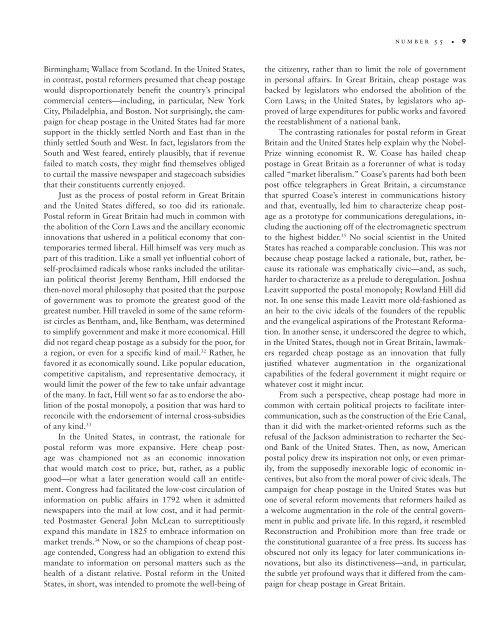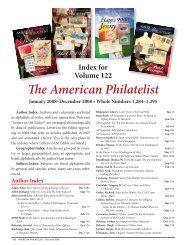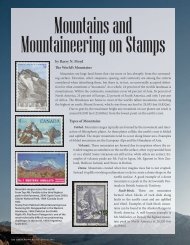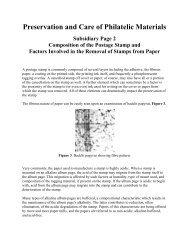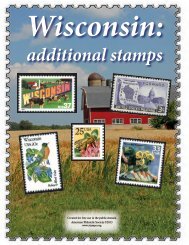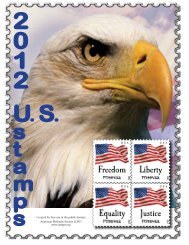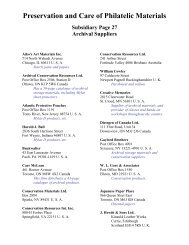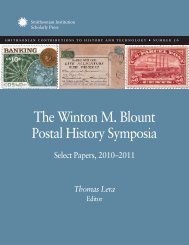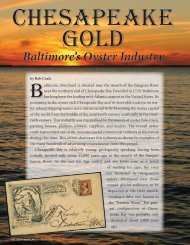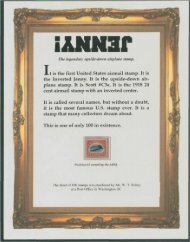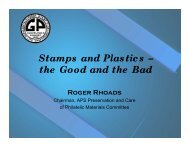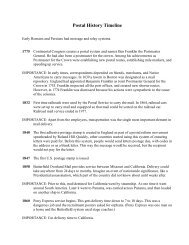The Winton M. Blount Postal History Symposia - Smithsonian ...
The Winton M. Blount Postal History Symposia - Smithsonian ...
The Winton M. Blount Postal History Symposia - Smithsonian ...
- No tags were found...
Create successful ePaper yourself
Turn your PDF publications into a flip-book with our unique Google optimized e-Paper software.
n u m b e r 5 5 • 9Birmingham; Wallace from Scotland. In the United States,in contrast, postal reformers presumed that cheap postagewould disproportionately benefit the country’s principalcommercial centers—including, in particular, New YorkCity, Philadelphia, and Boston. Not surprisingly, the campaignfor cheap postage in the United States had far moresupport in the thickly settled North and East than in thethinly settled South and West. In fact, legislators from theSouth and West feared, entirely plausibly, that if revenuefailed to match costs, they might find themselves obligedto curtail the massive newspaper and stagecoach subsidiesthat their constituents currently enjoyed.Just as the process of postal reform in Great Britainand the United States differed, so too did its rationale.<strong>Postal</strong> reform in Great Britain had much in common withthe abolition of the Corn Laws and the ancillary economicinnovations that ushered in a political economy that contemporariestermed liberal. Hill himself was very much aspart of this tradition. Like a small yet influential cohort ofself- proclaimed radicals whose ranks included the utilitarianpolitical theorist Jeremy Bentham, Hill endorsed thethen- novel moral philosophy that posited that the purposeof government was to promote the greatest good of thegreatest number. Hill traveled in some of the same reformistcircles as Bentham, and, like Bentham, was determinedto simplify government and make it more economical. Hilldid not regard cheap postage as a subsidy for the poor, fora region, or even for a specific kind of mail. 32 Rather, hefavored it as economically sound. Like popular education,competitive capitalism, and representative democracy, itwould limit the power of the few to take unfair advantageof the many. In fact, Hill went so far as to endorse the abolitionof the postal monopoly, a position that was hard toreconcile with the endorsement of internal cross- subsidiesof any kind. 33In the United States, in contrast, the rationale forpostal reform was more expansive. Here cheap postagewas championed not as an economic innovationthat would match cost to price, but, rather, as a publicgood—or what a later generation would call an entitlement.Congress had facilitated the low- cost circulation ofinformation on public affairs in 1792 when it admittednewspapers into the mail at low cost, and it had permittedPostmaster General John McLean to surreptitiouslyexpand this mandate in 1825 to embrace information onmarket trends. 34 Now, or so the champions of cheap postagecontended, Congress had an obligation to extend thismandate to information on personal matters such as thehealth of a distant relative. <strong>Postal</strong> reform in the UnitedStates, in short, was intended to promote the well- being ofthe citizenry, rather than to limit the role of governmentin personal affairs. In Great Britain, cheap postage wasbacked by legislators who endorsed the abolition of theCorn Laws; in the United States, by legislators who approvedof large expenditures for public works and favoredthe reestablishment of a national bank.<strong>The</strong> contrasting rationales for postal reform in GreatBritain and the United States help explain why the Nobel-Prize winning economist R. W. Coase has hailed cheappostage in Great Britain as a forerunner of what is todaycalled “market liberalism.” Coase’s parents had both beenpost office telegraphers in Great Britain, a circumstancethat spurred Coase’s interest in communications historyand that, eventually, led him to characterize cheap postageas a prototype for communications deregulations, includingthe auctioning off of the electromagnetic spectrumto the highest bidder. 35 No social scientist in the UnitedStates has reached a comparable conclusion. This was notbecause cheap postage lacked a rationale, but, rather, becauseits rationale was emphatically civic—and, as such,harder to characterize as a prelude to deregulation. JoshuaLeavitt supported the postal monopoly; Rowland Hill didnot. In one sense this made Leavitt more old- fashioned asan heir to the civic ideals of the founders of the republicand the evangelical aspirations of the Protestant Reformation.In another sense, it underscored the degree to which,in the United States, though not in Great Britain, lawmakersregarded cheap postage as an innovation that fullyjustified whatever augmentation in the organizationalcapabilities of the federal government it might require orwhatever cost it might incur.From such a perspective, cheap postage had more incommon with certain political projects to facilitate intercommunication,such as the construction of the Erie Canal,than it did with the market- oriented reforms such as therefusal of the Jackson administration to recharter the SecondBank of the United States. <strong>The</strong>n, as now, Americanpostal policy drew its inspiration not only, or even primarily,from the supposedly inexorable logic of economic incentives,but also from the moral power of civic ideals. <strong>The</strong>campaign for cheap postage in the United States was butone of several reform movements that reformers hailed asa welcome augmentation in the role of the central governmentin public and private life. In this regard, it resembledReconstruction and Prohibition more than free trade orthe constitutional guarantee of a free press. Its success hasobscured not only its legacy for later communications innovations,but also its distinctiveness—and, in particular,the subtle yet profound ways that it differed from the campaignfor cheap postage in Great Britain.


